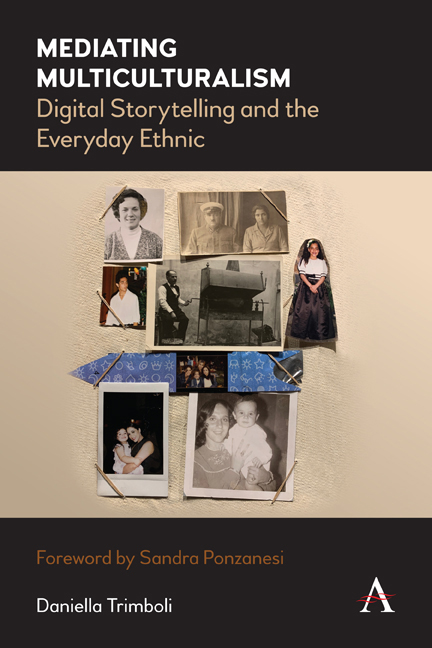Chapter Four - Everyday Ethnicity in Digital Publics
Published online by Cambridge University Press: 21 August 2020
Summary
All organized narration is a ‘matter for the police’.
– Derrida (1979)Digital storytelling is a useful vehicle for bringing marginalised voices into the public domain and allowing ordinary people to creatively share their experiences. However, there are several aspects of the medium that need to be analysed before it can be deemed an effective mode for destabilising dominant discourses. Digital storytelling is commonly positioned as a tool for enabling voice and worthy behaviour but tends to overlook how and why these aspects are enabled. And yet, like all forms of representation, the mode of digital storytelling undoubtedly constrains the terms of the speaking and ultimately the representation of the speaker, whether the speaking comes from an individual or a community perspective. The task for my analysis then is to consider how the genre operates as a technological form in the Foucauldian sense – a form that deploys particular notions of ethnicity – and consequently how it impacts the formation of ‘the ethnic’ in Australia and comparable nation-states. The following chapters will consider how it is that the genre informs, resists and/ or reproduces racialised notions of the subject within the context of everyday Australian narratives.
The individual digital stories chosen for analysis here are two films produced at ACMI: Sam Haddad's Loving Lebanon and Australia (LLAA, 2007) and Fatma Coskun’s New Life, New Country (NLNC, 2007). I have selected these films because, after viewing the 32 ACMI-produced migrant digital stories found online, certain patterns emerged pertaining to stories about migration and/ or cultural diversity in Australia. These patterns included: (1) three distinct narrative sections, (2) a linear movement from past to present/ bad to good, (3) the condensing of convoluted experiences into a palatable trajectory and (4) a summation of the whole experience of one-off migration. The two films LLAA and NLNC exemplified the typical migrant digital story of those found not only in the ACMI collection but those produced via StoryCenter (United States), Pier 21 (Canada) and BBC's Video Nation (United Kingdom) collections.
In this chapter, I examine how norms of ethnicity and whiteness are animated in the individual digital stories. In doing so, I aim to reach a greater understanding of the conjuncture of everyday multiculturalism, in particular, the material ways so-called ethnic and non-ethnic subjects are enmeshed in Australian power relations pertaining to whiteness.
- Type
- Chapter
- Information
- Mediating MulticulturalismDigital Storytelling and the Everyday Ethnic, pp. 71 - 94Publisher: Anthem PressPrint publication year: 2020



